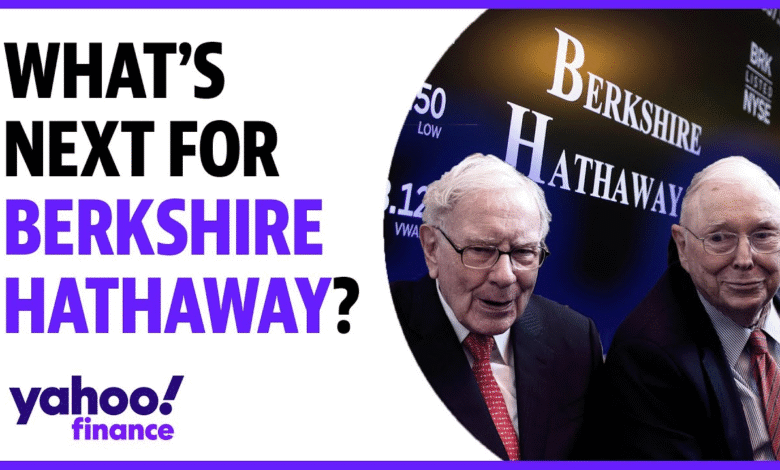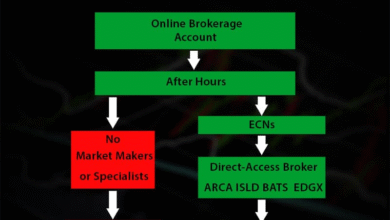Berkshire Hathaway Succession: Who Will Lead the Portfolio?

The impending Berkshire Hathaway succession invites both curiosity and concern as Warren Buffett prepares for his exit after 60 remarkable years. With the legendary investor stepping down as CEO in 2025, attention turns to who will take charge of the conglomerate’s vast $275 billion portfolio. Greg Abel, currently the vice chairman of non-insurance operations, is positioned to step into this critical leadership role, particularly in capital allocation decisions. However, the uncertainty lies in whether Abel will handle all aspects of Berkshire Hathaway’s portfolio management, especially given his limited background in stock picking. As Toby Combs and Ted Weschler, Buffett’s trusted investment managers, look to potentially expand their roles, the future landscape of investment management at Berkshire has left many shareholders pondering how the transition will shape the company’s legacy and investments moving forward.
As the business world anticipates Warren Buffett’s retirement, reflections on Berkshire Hathaway’s transition process are paramount. This leadership change opens discussions about the future direction of this investment behemoth, particularly under the stewardship of Greg Abel. Known for his operational expertise, Abel’s leadership could significantly redefine capital allocation strategies once he assumes the CEO position. Simultaneously, reevaluation of the investment roles of Todd Combs and Ted Weschler becomes essential, as their experience in hedge fund management may play a crucial role in steering Berkshire’s stock portfolio. Navigating this pivotal moment effectively could determine how well the company maintains its historic performance and investor confidence in the years ahead.
The Transition of Leadership at Berkshire Hathaway
As Warren Buffett prepares for his exit from the helm of Berkshire Hathaway by the end of 2025, the focus intensifies on the future leadership and its implications for the company’s vast investment strategies. Buffett has long been the guiding force behind the investment decisions that have shaped Berkshire’s formidable portfolio, a task that will now fall to Greg Abel. While Abel’s operational expertise is well-documented, the question remains whether he possesses the financial acumen required to manage the $275 billion portfolio effectively. Shareholders are anxious to see how he will balance capital allocation responsibilities with stock selection, a critical aspect of Berkshire’s investment philosophy.
Abel’s ascension marks a significant turning point for Berkshire Hathaway. The management of its extensive portfolio encapsulates both a strategic challenge and an opportunity for growth. Investors and analysts alike are curious to see if Abel’s approach will incorporate the patient value investing style that has become synonymous with Buffett. Additionally, with Todd Combs and Ted Weschler poised to take on more responsibilities in investment management, the operational dynamics at Berkshire are bound to shift as these key players potentially influence stock picking and deal-making strategies.
The Role of Todd Combs and Ted Weschler in Berkshire’s Future
With Buffett’s announcement of his pending retirement, Todd Combs and Ted Weschler are expected to play a more significant part in overseeing Berkshire Hathaway’s investment management. Each has independently managed large sums of Berkshire’s capital, showcasing their ability to contribute to the company’s long-term financial success. Their past performances, tied to hedge fund origins and backed by a strong understanding of market dynamics, position them favorably to assist in navigating the complexities of an evolving investment landscape.
Despite the challenges in revealing their recent track records, the insight and innovative strategies that Combs and Weschler bring to the table could prove invaluable during this transitional phase of Berkshire’s leadership. They have demonstrated skill in identifying opportunities in the market, and their potential expanded roles could create a dual-management effect that combines their investment insights with Abel’s operational leadership. As shareholders await clarity regarding the succession plan, the collaboration between these investment leads could be essential for maintaining the company’s competitive edge.
Berkshire Hathaway’s Investment Management Strategies Moving Forward
The management of Berkshire Hathaway’s investments is poised for an evolution as new leadership strategies come into play. Greg Abel’s mandate to continue Buffett’s legacy will necessitate a thorough examination of existing investment management strategies, especially concerning capital allocation and stock purchasing decisions. The integration of Todd Combs and Ted Weschler into more prominent roles could infuse fresh perspectives into Berkshire’s investment approach while steering clear of risky ventures that could jeopardize the company’s established reputation.
In evaluating future strategies, it’s essential to assess how Abel, Combs, and Weschler will work together to formulate a responsive investment framework that capitalizes on emergent market trends. As they assess the performance metrics and risks associated with their portfolio management, their collective experiences will guide Berkshire Hathaway’s decisions in both equity investments and broader financial commitments. Stakeholders will be keen to observe their strategic choices, especially as the market continues to shift around them.
Greg Abel’s Leadership Style and Investment Philosophy
Greg Abel’s leadership style is expected to be one of operational efficiency matched with prudent decision-making, reflecting Buffett’s long-held philosophy of value investing. His background in operational management rather than investment expertise raises questions regarding his approach to asset allocation and risk management. Observers are keen to understand how Abel plans to uphold Buffett’s legacy while potentially adapting his strategies to a modern investment landscape that increasingly favors agile, data-driven decisions.
Abel’s commitment to deploying Berkshire Hathaway’s vast capital reserves judiciously will be put to the test as new opportunities arise. The challenge will be to remain consistent with the company’s core investment principles while embracing necessary changes in response to market evolution. Abel’s strategies will determine effects on long-term sustainable growth, preserving shareholder value and maintaining Berkshire’s historical commitment to thoughtful investing that reflects Buffett’s ethos.
Future of Capital Allocation at Berkshire Hathaway
Capital allocation has long been a cornerstone of Berkshire Hathaway’s investment strategy, and its future under Greg Abel’s leadership will be closely scrutinized. Warren Buffett has emphasized the importance of carefully assessing the merits of various investments, signaling that financial discipline remains a priority. As Abel prepares to take the reins, he must navigate this complex landscape, defining a clear vision for how Berkshire will deploy its substantial cash reserves in pursuit of growth.
Shareholders are eager to see if Abel will maintain Buffett’s philosophy of strategic patience or adopt a more aggressive approach to capital deployment. With considerable financial resources at his disposal, Abel’s decisions regarding mergers, acquisitions, and investments in technology companies could shape the trajectory of Berkshire’s portfolio for years to come. The success of these initiatives will hinge on his ability to blend innovation with the core value-driven principles instilled by Buffett.
The Importance of Succession Planning at Berkshire Hathaway
Berkshire Hathaway’s approach to succession planning is one that emphasizes continuity and stability, especially critical as Warren Buffett prepares to exit the stage. The clarity of plans regarding leadership roles post-Buffett can significantly affect investor confidence and the overall perception of the company. As events unfold leading to 2025, shareholders will be eager for insights into how succession will influence both investment decisions and corporate governance at Berkshire Hathaway.
The preparations underway for leadership transition reflect a broader understanding of corporate longevity, where the knowledge and expertise of established leaders are passed onto their successors. The Company’s commitment to succession planning ensures that the principles guiding its operations and investments will persist beyond Buffett’s tenure, with Abel, Combs, and Weschler representing a blend of tradition and future-forward thinking that aligns with Berkshire’s historic investment philosophy.
Warren Buffett’s Legacy: The Challenge of Carrying It Forward
Warren Buffett’s remarkable legacy is one of value-driven investing, marked by distinctive strategic choices that have propelled Berkshire Hathaway to unprecedented heights. As his departure approaches, the challenge of sustaining this legacy falls onto the shoulders of his successors. They must weave Buffett’s teachings into modern investment strategies that consider the complexities of a rapidly changing financial landscape while maintaining the foundation that defines Berkshire’s success.
The incoming leaders must not only honor Buffett’s principles but also innovate in ways that reflect market realities. Striking the right balance between legacy and innovation will be paramount as they aim to preserve the unique competitive advantages that Berkshire Hathaway has cultivated. How effectively Combs, Weschler, and Abel interpret and apply Buffett’s philosophies will directly impact investor sentiment and the company’s future profitability.
Investment Management at Berkshire: Insights from Buffett’s Tenure
Warren Buffett’s tenure as CEO has shaped the investment management landscape at Berkshire Hathaway, instilling a culture of disciplined capital allocation and long-term thinking. His emphasis on using cash reserves to capitalize on opportunities has led to groundbreaking acquisitions and partnerships, defining the conglomerate’s operational ethos. This legacy leaves an indelible mark on how future leaders will approach investment management, particularly as they adapt strategies to evolving market conditions.
In the wake of Buffett’s exit, the organization must navigate new challenges while remaining true to its principles. Understanding the lessons learned from Buffett’s successes and occasional missteps will be critical for Combs and Weschler as they deepen their roles in investment management. With the upcoming leadership changes, the focus will likely shift towards a more collaborative investment management approach, drawing on the diverse strengths of each leader to enhance Berkshire’s overall portfolio performance.
Market Reactions and Predictions Post-Buffett
As Warren Buffett’s exit becomes imminent, market analysts and investors are closely monitoring potential impacts on Berkshire Hathaway’s stock performance. Changes in leadership often spur fluctuations in investor confidence, particularly concerning how new leaders will preserve the company’s long-standing investment strategies. These reactions highlight not only the emotional attachment shareholders have to Buffett but also the critical need for clarity regarding the company’s future direction.
Predictions about the market’s response to the transition suggest that maintaining transparency and consistent communication from leadership will play vital roles. As they share their plans for navigating investment management at Berkshire, Abel and his team may alleviate some shareholder anxiety. A strategic commitment to long-term value creation, grounded in Buffett’s principles, could instill confidence in investors that Berkshire Hathaway will continue to thrive even after the departure of its iconic leader.
Frequently Asked Questions
What does Warren Buffett’s exit mean for Berkshire Hathaway’s succession plan?
Warren Buffett’s exit from the CEO position of Berkshire Hathaway at the end of 2025 marks a significant shift in the company’s succession plan. Greg Abel, currently the vice chairman of non-insurance operations, is expected to take over leadership, primarily focusing on capital allocation rather than stock picking.
Who will handle the investment management at Berkshire Hathaway after Buffett departs?
Following Warren Buffett’s departure, investment management at Berkshire Hathaway will likely be overseen by Todd Combs and Ted Weschler, who have managed around $15 billion each. While they’re expected to have a more prominent role, Greg Abel will focus on capital allocation and may bring in additional portfolio managers.
Is Greg Abel prepared to manage Berkshire Hathaway’s $275 billion portfolio?
Greg Abel is set to manage Berkshire Hathaway’s operations and capital allocation, but his track record as a stock picker remains uncertain. Analysts like David Kass believe that his strength lies in managing acquisitions rather than day-to-day stock management.
What roles will Todd Combs and Ted Weschler play in Berkshire Hathaway’s future?
Todd Combs and Ted Weschler are anticipated to take on expanded responsibilities in managing Berkshire Hathaway’s stock portfolio. Their past performance has contributed to speculation that they could play a major role alongside Greg Abel in driving investment strategy.
How might Berkshire Hathaway’s succession impact its investment strategies?
Warren Buffett’s succession will likely shift Berkshire Hathaway’s investment strategies. While Abel is focused on operational management and capital allocation, Combs and Weschler may lead stock selection, signaling a possible transition towards a more team-based investment approach.
What are the concerns regarding Berkshire Hathaway’s stock performance after Buffett’s exit?
Concerns regarding stock performance after Buffett’s exit center on the lack of clarity about leadership roles in investment management. Analysts note that Greg Abel, while strong operationally, may not possess the same investment expertise as Buffett, potentially affecting shareholder confidence.
Could Berkshire Hathaway establish a chief investment officer role after Buffett?
Yes, there is speculation that Berkshire Hathaway could create a chief investment officer role, possibly filled by Ted Weschler, to oversee its investments more effectively. This could enhance investment strategy alignment in light of Buffett’s departure.
Will Warren Buffett remain involved with Berkshire Hathaway after stepping down as CEO?
Yes, Warren Buffett will continue as chairman of the board, providing guidance and oversight even after he steps down as CEO in 2025. His extensive experience and understanding of the business are expected to remain influential during the transition.
What is the reaction of shareholders to the upcoming Berkshire Hathaway succession?
Shareholders have expressed mixed reactions to the Berkshire Hathaway succession. While there is support for Greg Abel’s leadership, concerns persist about the company’s future investment management and capital allocation strategies in the absence of Warren Buffett.
How does Greg Abel plan to continue Warren Buffett’s investment philosophy?
Greg Abel intends to maintain Warren Buffett’s patient value investing style, emphasizing thorough understanding of businesses before allocating capital. His approach will focus on capital deployment when opportunities align with Berkshire’s investment principles.
| Key Point | Details |
|---|---|
| Warren Buffett’s Succession Plan | Warren Buffett will step down as CEO at the end of 2025 after a 60-year tenure, but remain as chairman. |
| Greg Abel’s Role | Greg Abel, currently 62, is set to take over CEO responsibilities, focusing on capital allocation rather than stock picking. |
| Investment Managers | Todd Combs and Ted Weschler have managed about $15 billion each and may gain more responsibility in managing stock portfolios. |
| Potential CIO Role | There’s speculation that Weschler could become the chief investment officer overseeing investments. |
| Investment Strategy Continuation | Abel aims to continue Buffett’s value investing strategy and will be ready to utilize Berkshire’s $347 billion cash reserve. |
Summary
Berkshire Hathaway succession is a pivotal moment as Warren Buffett plans to transition leadership at the end of 2025. With Greg Abel at the helm, the company aims to maintain its strong value investing philosophy while potentially increasing the roles of Todd Combs and Ted Weschler in managing the substantial stock portfolio. This change leaves investors and shareholders eager to see how these executives will adapt to the legacy of Buffett and the challenges ahead for Berkshire Hathaway.




